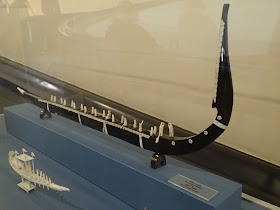This is the final post about a current exhibit of boat models and canoe paddles at the Vatican Museums. Previous posts about this exhibit cover the other models representing boats from outside the Western tradition, and one full-size canoe from the Solomon Islands. As noted in the previous posts, exhibit signage was sparse. We reproduce the English text of the exhibit cards in quotation marks. Our own comments appear in parentheses. As always, click any image to enlarge.
 |
| "Tahiti: Catamaran" (The two hulls are essentially the same but with their ends reversed. The boat should perform the same in either direction when it shunts.) |
 |
| "Aotearoa New Zealand: Maori boat" (A monohull war canoe. See our earlier post on boats like this.) |
 |
| "Papua New Guinea: Three hull catamaran" (beautiful double crab-claw rig) |
 |
| (Same model as above, showing the hull configuration.) |
 |
| "Papua New Guinea: Boat with outrigger" (The main hull is a dugout with high washstrakes stitched in place) |
 |
| "Solomon (Islands): Canoe with bird shaped bow" (Somewhat similar to the full-size canoe that serves as the exhibit's centerpiece.) |
 |
| "Fiji: Sailing boat" (Twin-hull canoe with oceanic lateen sail) |
 |
| (Same model as previous. The port hull is much smaller and shorter than the starboard, but it is nonetheless a true hull, not an outrigger float.) |
 |
| "Chile; Alakaluf Canoe" (This looks much like the Yamana/Yaghan canoe we've written about previously.) |
 |
| "Alaska: Canoe" (Adney called this a "kayak-form canoe.") |
 |
| "Chile: Yaghan (Yamana) canoe" (Images created by Europeans show greatly different forms of Yaghan or Yamana canoes. See the Alakaluf canoe two images above.) |
 |
| "Canada: Canoe" (...and a rather fanciful one at that! We're not aware of any bark canoes built with full decks and a round cockpit coaming. The modeler seems to be combining aspects of the open bark canoe with the skin-on-frame kayaks of Alaska.) |
 |
| "Brazil: Caraja river boat" (The cargo of what appears to represent a dugout canoe is probably tortoises or sea turtles. At the right is a pregnant woman; at the left, a baby.) |
 |
background: "Canada: Canoe"
foreground: "Alaska: Bark canoe" |
 |
| "Bolivia: Mosetenes raft" (A double-hull raft. Perhaps it is built to be separated, so that it can be used as two smaller craft.) |
 |
| "Peru - Bolivia: Ayamara boat"(A reed boat of the type used on Lake Titicaca.) |
 |
background: "Rocky Mountains: Canoe"
foreground: "USA: Canoe"
(Both are birchbark types.) |
 |
background: "Madagascar: Dugout canoe"
middle-right: "Madagascar: Dugout canoe"
left: "...West Coast" (presumably Africa; we failed to capture the full label text)
front-right: "Madagascar: Dugout canoe" |
 |
| "Mozambique: Raft" (We'd call this a coracle, not a raft, since it relies on the enclosure of space for buoyancy. The model is made from a single piece of bent bark. If the full-size boat is built the same way, it must be quite small, or else it requires an enormously wide tree.) |
 |
| "Africa - East Coast: Sailing boat with outrigger" (The main hull is extraordinarily narrow and highly rockered. This must be a thrilling boat to sail.) |
 |
background: "Congo: Canoe with rower" (a paddler, in fact)
foreground: "Congo: Canoe" |
 |
background: "Nigeria: Boat with two rowers" (paddlers)
middle: "Nigeria: Boat with passengers"
front: "Nigeria: Boat with passengers"
(All three represent dugouts with an aft platform carved as an integral part of the hull for the stern paddler/helmsman. Locating the paddle force so far aft of the submerged part of the hull lends a great deal of power for turning and correcting strokes, making these boats highly maneuverable.) |
 |
| "Nigeria: Yoruba boats: H.E. Mons, Carlo Maria Viganò" (These were the only models in the exhibit credited to whom we assume was the donor or lender.) |
 |
| A nice selection of canoe paddles were exhibited at the end of each of the spiral levels of the hall, unfortunately with no exhibit cards or other identification. (This photo by Cate Monroe) |
 |
| A closer look at the paddles on the middle level. |
(All images by the blogger except as noted.)







































